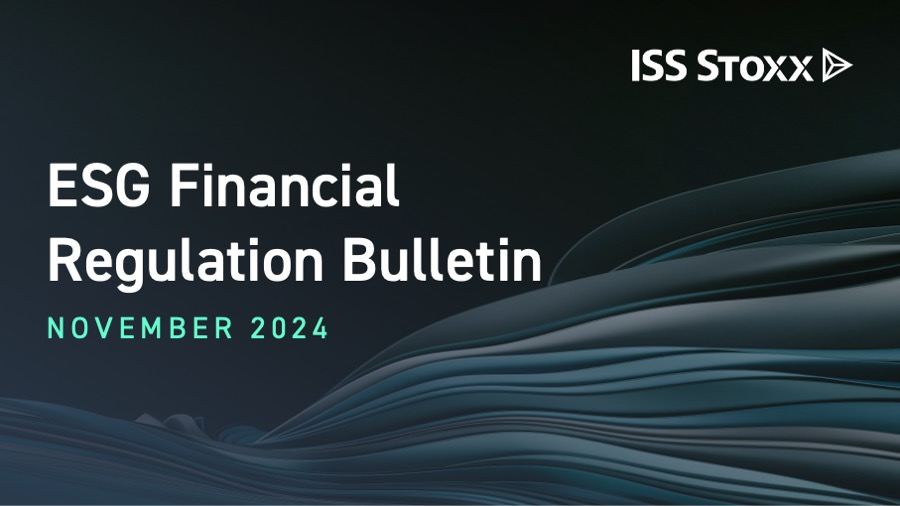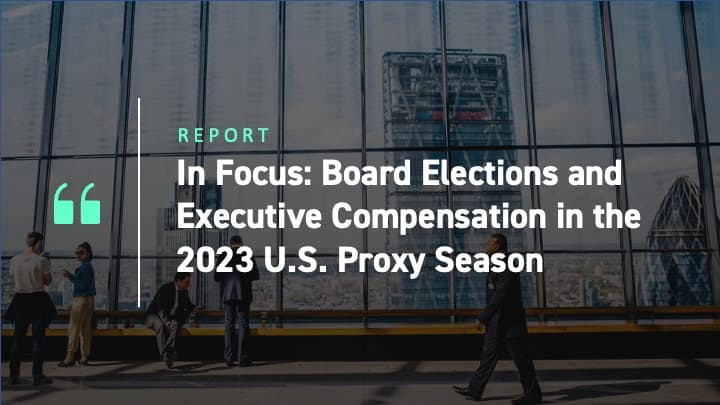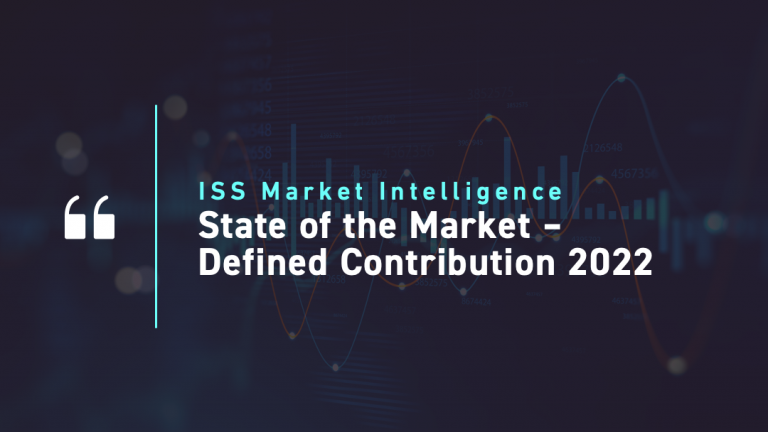International
IFRS
International Sustainability Standards Board Publishes Updates to its Digital Sustainability Standards Taxonomy
The International Sustainability Standards Board (ISSB) announced on October 28 revisions to the SASB Standards Taxonomy to align it with the latest amendments to the IFRS S2 Climate-related Disclosures and the developments from the 2023 International Applicability of the SASB Standards Project. The SASB Standards Taxonomy allows companies to tag their sustainability-related financial disclosures so that the information is computer-readable and in a digital format.
GRI
Global Reporting Initiative Announces Collaboration with Climate & Company to Expand Adoption of Sustainability Reporting Standards
The Global Reporting Initiative (GRI) signed a Memorandum of Understanding (MoU) on October 21 with Climate & Company, a non-profit think tank focused on “making regulatory standards work in practice.” The MoU outlines the two organizations’ collaboration on projects, engagements, and events to support the adoption and utilization of the GRI Standards globally, primarily to “address the impact side of the European Sustainability Reporting Standards (ESRS) and encourage disclosure by SMEs and value chain actors globally.” The GRI and Climate & Company also agreed to submit joint funding proposals to promote sustainability reporting throughout the EU and G20.
SBTi
Science Based Targets Initiative Launches New Website to Assist with Setting and Validating Decarbonization Commitments
The Science Based Targets initiative (SBTi) launched a new services website on October 23 with information and resources for companies setting decarbonization commitments and entities submitting their SBTi targets for validation. In the last year, following increased demand for, and adoption of, SBTi targets, the non-profit SBTi organization launched a wholly-owned subsidiary, SBTi Services Limited, to assist corporations and financial institutions with target validation. The SBTi services website includes a new ‘Validation Portal’ that will allow eligible organizations to submit and validate their SBTi targets.
APAC
Japan
Japanese Financial Services Agency Hosts Second Forum for Financial Regulators in Asia
The Japanese Financial Services Agency (JFSA) participated in the second Asia High-level Financial Regulators’ Forum in Tokyo on October 2. During the Forum, Asia’s different financial regulators and supervisors exchanged their thoughts on how to strengthen supervision within the region. The Forum specifically focused on knowledge sharing on a “regulator’s role in enhancing sustainability and resilience” as well as the future of “transition finance.”
The Paris Agreement Article 6 Implementation Partnership Holds First Expert Training in Japan
The Paris Agreement Article 6 Implementation Partnership (A6IP) Center hosted practitioners from twenty countries in Hayama, Japan, from September 25 to 27 to discuss how to implement emissions reduction and removal goals from Article 6 of the Paris Agreement. The A6IP is an initiative launched by Japan’s Ministry of Environment and partner organizations to coordinate cross-border knowledge sharing and cooperation in line with the Paris Agreement. During the training, international practitioners discussed the “mechanisms of Article 6,” case studies from different countries, and GHG reduction targets set in Nationally Determined Contributions (NDCs).
Hong Kong
International Capital Markets Association Launches Hong Kong Voluntary Code of Conduct for Providers of ESG Ratings and Data Products
The International Capital Markets Association (ICMA) published the final version of the Hong Kong Code of Conduct for ESG Ratings and Data Products Providers (CoC) on October 3. The CoC was created by the ICMA and the Voluntary Code of Conduct Working Group (VCWG) and is sponsored by the Hong Kong Securities and Futures Commission (SFC); the ICMA published the final Code of Conduct following a consultation on the draft CoC earlier in 2024. The Hong Kong CoC is designed to be proportionate and globally interoperable: its provisions are closely aligned with those of the U.K. Code of Conduct for ESG Ratings and Data Products Providers, developed by the Data and Ratings Working Group with the support of ICMA and the International Regulatory Strategy Group (IRSG), and based on the recommendations from the International Organization of Securities Commissions’ Report on “Environmental, Social, and Governance (ESG) Rating and Data Products Providers.” The ICMA will host a launch event for the Code of Conduct on November 29.
Hong Kong Monetary Authority Publishes Vision for Sustainable Finance Initiatives
The Hong Kong Monetary Authority (HKMA) launched on October 21 its Sustainable Finance Action Agenda, which focuses on four principal areas: Net Zero-aligned banking, sustainable investments, Net Zero financing, and improving the inclusivity of sustainability. Within each principal area, the HKMA sets out goals designed to ensure Hong Kong facilitates “sustainable fund flows” and ensures “banks manage the risks associated with the net zero transition properly”; the HKMA’s goals include ensuring all Hong Kong banks work towards achieving Net Zero in their operations by 2030 and in financed emissions by 2050 and supporting consistent and comprehensive sustainability disclosure by Hong Kong companies. The HKMA will focus its efforts on implementation initiatives for its Action Agenda and will continue to release further guidance and resources in line with Hong Kong’s sustainability goals.
Malaysia
Securities Commission Malaysia and World Bank Release Joint Report on ESG Disclosure Practices in Malaysia
The Securities Commission Malaysia (SC) and the World Bank launched a report on October 15 on the “ESG Disclosure Assessment of Malaysia’s Listed Companies and Recommendations for Policy Development.” The report covers the “baseline” of current ESG disclosure from Malaysian-listed companies and institutional investors. The joint report found that Malaysian-listed companies had sufficient levels of governance disclosure and adequate management of governance and social issues; however, the report also outlined large insufficiencies in environmental disclosure, specifically on climate change and biodiversity, and significant variance in the ESG disclosure between large and small companies. The report also provided recommendations for policymakers and market participants to improve current ESG disclosure practices and align sustainability reporting with international best practices: specifically, the SC and World Bank encouraged further efforts to implement Bursa Malaysia’s guidelines for sustainability reporting and develop “ESG practices among domestic investors to increase appeal for corporate ESG disclosures.” The SC and World Bank analyzed 90 companies listed on Bursa Malaysia, as well as several large Malaysian asset owners, to write their joint report.
SC Hosts Association of Southeast Asian Nations Bond Market Forum on Sustainable Finance and Ethics
The Malaysian SC hosted the 41st meeting of the ASEAN+3 Bond Market Forum (ABMF) in Kuala Lumpur on October 28; the Association of Southeast Asian Nations (ASEAN) plus the People’s Republic of China, Japan, and the Republic of Korea are collectively known as ASEAN+3. Dato’ Mohammad Faiz Azmi, chairman of the SC, delivered the opening remarks ahead of Malaysia’s upcoming chairmanship of ASEAN in 2025. In his speech, the chairman outlined Malaysia’s ongoing efforts to promote funding in sustainability-related projects, as well as its ongoing difficulties in growing its ESG bond market.
Indonesia
Indonesian Financial Services Authority and Bank Negara Malaysia Meet to Discuss Collaboration on Sustainable Finance and Islamic Banking Initiatives
The Indonesian Financial Services Authority (Otoritas Jasa Keuanga; OJK) and the Bank Negara Malaysia (BNM) met on September 28 to discuss potential bilateral cooperation on initiatives to promote Islamic banking, sustainable finance, and financial services development in the Malaysian and Indonesian markets. The two organizations announced that they will work jointly on “developing climate risk management policies,” share regulatory insights on how to best supervise “green finance activities,” and encourage best practices in sustainable finance implementation.
ASEAN
ASEAN Capital Markets Forum Meets to Progress Latest ASEAN Transition Finance Initiatives
The ASEAN Capital Markets Forum (ACMF) held its 41st Chairs’ meeting in Vientiane, Lao PDR, on October 21 to discuss how to establish “deep, liquid and integrated ASEAN regional capital markets.” In the ACMF meeting, the member countries officially endorsed the ASEAN Transition Finance Guidance Version 2. The Guidance provides ASEAN companies, investors, and financial institutions with common terminologies and guidance for carbon emissions reduction transition plans. During the meeting, the ACMF also welcomed progress on several other ASEAN green finance initiatives, such as the development of the ASEAN Taxonomy for Sustainable Finance Version 4; the launch of the Asia Green Transformation Consortium; the 2024 update to the ASEAN Corporate Governance Scorecard Assessment; and the ongoing ASEAN Voluntary Carbon Markets Study.
Australia
Australian Securities & Investments Commission Release Updated Guidance for Carbon Market Participants
The Australian Securities & Investments Commission (ASIC) published “Regulatory Guide 236 Do I need an AFS licence to participate in carbon markets? (RG 236)” on September 30. RG 236 offers updated regulatory guidance for different financial market participants on whether they require an AFS license to participate in the Australian carbon market; the guidance covers the activities of service providers who offer financial product advice, as well as market participants “dealing in emission units regulated as financial products,” such as Australian Carbon Credit Units (ACCUs) and Safeguard Mechanism Credits (SMCs). The ASIC released the updated RG 236 to reflect shifts in the Australian carbon market stemming from the safeguard mechanism reforms passed in 2023, as well as “changes to the ACCU scheme that have occurred since RG 236 was last re-issued in May 2015.”
Australian Sustainable Finance Institute Launches Final Public Consultation on Sustainable Finance Taxonomy
The Australian Sustainable Finance Institute (ASFI) opened its second, and final, round of consultations on the Australian Sustainable Finance Taxonomy on October 30. The ASFI and Australian Commonwealth Department of the Treasury have been jointly developing the Australian Taxonomy since July 2023. The second round of consultation will focus on the development of a “Do No Significant Harm framework,” minimum safeguards for social issues, climate change mitigation criteria for six priority sectors (“electricity generation and supply; minerals, mining, and metals; buildings; manufacturing and industry; transport; and agriculture and land use”), and potential use cases for the sustainable finance taxonomy. The consultation period is open until December 1; the ASFI has stated it plans to conclude the “initial development phase” of the Taxonomy in December 2024.
New Zealand
External Reporting Board Proposes Amendments to the New Zealand Climate and Assurance Standards
The New Zealand External Reporting Board (XRB) opened a consultation on October 8 on proposed amendments to the Climate and Assurance Standards. The XRB opened the consultation in response to concerns from climate reporting entities (CREs) who have described having difficulty fulfilling certain climate disclosure requirements in the absence of comprehensive guidance, as well as reliable and affordable data. CREs have also described having difficulty obtaining adequate assurance for their Scope 3 GHG emission disclosures due to data reliability issues. The XRB has proposed amendments to New Zealand’s climate standards and GHG emissions assurance standards to provide CREs with relief on issues of concern. The XRB’s consultation on the proposed amendments closed on October 30.
In an October 15 speech, Samantha Barrass, the chief executive of the New Zealand Financial Market Authority (FMA), highlighted the XRB’s amendments as an example of the FMA’s responsive and collaborative approach to climate disclosure regulation. The chief executive also noted that the FMA will add exemptions to its Green Bonds regulation following feedback on how to increase efficiency and decrease compliance costs of bringing Green Bonds to market.
Europe
EU
European Securities and Markets Authority Publishes Its Enforcement Priorities for 2024 Corporate Reporting Supervision
The European Securities and Markets Authority (ESMA) issued its annual European Common Enforcement Priorities (ECEP) Statement for 2024 on October 24. The ECEP Statement highlights key areas of focus for 2025 as ESMA and other European national competent authorities supervise corporations’ IFRS financial statements, sustainability statements, and European Single Electronic Format (ESEF) digital reporting. With regards to corporate sustainability statements, the ESMA highlighted companies’ materiality judgements in their European Sustainability Reporting Standards (ESRS) reporting, all corporate disclosure related to Article 8 of the EU Taxonomy Regulation, and the “scope and structure of [company’s] sustainability statements” as areas of particular focus. The ECEP statement also highlights the importance of having connectivity between financial and non-financial information in corporate disclosure.
ESMA and the Joint Committee of the European Supervisory Authorities Publish Work Programmes for 2025
The ESMA released its Work Programme for 2025 on October 1. The Work Programme highlighted the key strategic priorities for the regulator in the coming year: in its effort to make the European market more “attractive and efficient,” ESMA will focus on the implementation of mandates it received from the EU’s legislative bodies in 2024: drafting effective Regulatory Technical Standards (RTS) for the European Green Bond and ESG Rating Providers Regulations. In its Work Programme, the ESMA also outlines its aspirations to improve collaboration with other EU and EU member state financial regulators.
The European Supervisory Authorities (ESAs), a joint committee of ESMA, the European Insurance and Occupational Pensions Authority (EIOPA), and the European Banking Authority (EBA), published their own Work Programme for 2025 on October 7. The ESAs’ Work Programme highlights that the regulators’ primary focus for the coming year will be on improving the EU’s digital resilience and “promoting sustainability in the EU financial system.” As part of their green finance efforts, the ESAs will engage in joint work to provide further guidance on improving sustainability disclosure from financial market participants.
Council of the European Union Agrees on Amendment to Delay Application of EU Deforestation Law by 12 Months
The Council of the European Union (the Council), one of the EU’s two primary legislative bodies, agreed on October 16 on a targeted amendment to postpone the application date of the EU Deforestation regulation by one year. The Council agreed on the amendment to “allow third countries, member states, operators and traders to be fully prepared in their due diligence obligations” from the deforestation law, which include ensuring that specific commodities and products sold in, or exported from, the EU are “deforestation-free.” The updated application date for these obligations is now 30 December 2025 for large operators and traders and 30 June 2026 for micro- and small enterprises.
European Financial Reporting Advisory Group and the Taskforce on Inequality and Social-Related Financial Disclosures Sign Cooperation Agreement
The European Financial Reporting Advisory Group (EFRAG) and the Taskforce on Inequality and Social-related Financial Disclosures (TISFD) agreed on September 27 to cooperate on aligning and promoting disclosure frameworks for global businesses and financial institutions. As part of their cooperation agreement, the EFRAG and TISFD plan to “align and enhance guidance on inequality and social-related financial disclosures” by increasing compatibility between the requirements of EFRAG’s ESRS disclosures and TISFD’s global reporting framework. The two organizations also intend to cooperate on implementation webinars, guidance, messaging, and tools to facilitate increased corporate disclosure on social issues.
UK
Financial Conduct Authority Responds to Transition Finance Market Review Report and Recommendations
The U.K. Financial Conduct Authority (FCA) responded on October 17 to the Transition Finance Market Review (TFMR) report on how to deliver on the Paris Agreement’s decarbonization goal through scaling investments in transition finance. The TFMR report, managed by the City of London, focuses on how to create policies that encourage investment through “collaboration between government, investors, business, and civil society.” The report also called for the FCA to increase communication on their role in promoting investment in transition financing. In their response to the TMFR report, the FCA outlined their key policy initiatives to promote green finance, including working with the U.K. government to create a regulatory regime for ESG ratings providers; engaging with the TFMR and other relevant stakeholders in the Climate Financial Risk Forum; consulting with the U.K. Government as they consider endorsing ISSB sustainability disclosure standards; and continuing to issue relevant guidance, including on the U.K.’s anti-greenwashing rule.
UK Investment Association Publishes Updated Principles of Remuneration
The U.K. Investment Association (IA) released its updated Principles of Remuneration, reflecting IA members’ evolving views on executive pay for U.K. corporations, on October 8. The IA Principles, which build on expectations from the U.K. Corporate Governance Code, provide a flexible framework to encourage companies to adopt remuneration structures that maintain their competitiveness while working in the long-term interest of their shareholders (for more information, see ISS Insights Analysis of the IA Principles).
Americas
Canada
Canadian Department of Finance Announce New Sustainability Initiatives to Advance Net Zero by 2050 Aims
Chrystia Freeland, Canada’s deputy prime minister and minister of Finance, announced on October 9, during the Principles for Responsible Investment (PRI) conference in Toronto, that Canada’s government is working on releasing “Made-in-Canada sustainable investment guidelines” and “mandatory climate-related financial disclosures for large, federally incorporated private companies.” The Made-in-Canada guidelines are designed to promote private sustainable investment by working as a taxonomy to identify “green” and “transition” activities. The Canadian Government initially committed to creating a green “Made-in-Canada taxonomy” during its 2023 Fall Economic Statement.
The finance minister also announced that the government is planning on proposing amendments to the Canada Business Corporations Act that will require large, federally incorporated Canadian private companies to provide climate-related disclosures. The government will launch a “regulatory process” to determine the details of the required disclosures, which companies would be in the scope of these requirements, and how to encourage small- and medium-sized private businesses to voluntarily disclose climate information.
Ontario Securities Commission Publishes Insights into Its Sustainable Finance Regulatory Approach
The Ontario Securities Commission (OSC) published its “Insights on the OSC Staff’s Approach to Sustainable Finance” on October 7. The insights document covers OSC’s past work on sustainable finance issues and outlines the regulators’ expected approach to sustainable finance for the coming years. The OSC insights primarily focus on three key pillars: protecting investors through effective regulation, education, and oversight; demonstrating leadership and influence in Canadian sustainable finance regulation; and anticipating future needs in the “rapidly evolving area of sustainable finance.” The OSC also confirm that it will continue to pursue regulatory initiatives to provide investors with consistent, comparable, and useful information on material ESG-related risks.
By:
Noam Cherki, Associate, Regulatory Affairs & Public Policy, ISS STOXX
Hugo Gallagher, Senior Associate, Regulatory Affairs & Public Policy, ISS STOXX
Karina Karakulova, Director of Regulatory Affairs & Public Policy, ISS STOXX




